
 Come away O human child
Come away O human child
To the waters and the wild
With a fairy hand in hand
For the world’s more full of weeping
Than you can understand.
— W.B. Yeats, by way of Steven Spielberg’s AI
“…if we’re to be helped, it’s got to be by magic.”
— Woody Allen, by way of Mockingbird (7/21/09)
This week I’d like to talk about five movies where fantasy and dream and magic and childhood meet: Coraline, Paperhouse, The Innocents, The Red Balloon, and AI.
This movie was just released this week on DVD. Very worth seeing.
Check out R-J’s great review of it five months ago. Now that I have seen it, I agree with him that it’s a bad movie for small kids; though it might fine for kids older than that, as long as they are prepared to be scared. (That should be a movie slogan.)
R-J and I see the movie a bit differently in other respects: he sees it as having a Message, which I don’t thankfully, since I cordially dislike all message movies. I do think it deals with real terrors, hopes, and dreams embedded in childhood.
The author of the book it was based on is Neil Gaiman, who wrote in my opinion the best fantasy novel of the last twenty years (Neverwhere).
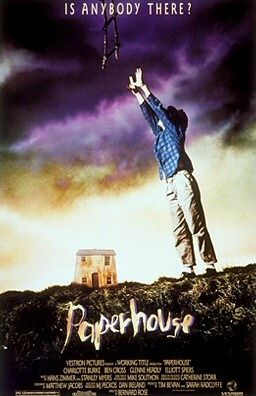 Paperhouse
Paperhouse
Sadly this is no longer available on DVD. But if somehow you can find an old copy, or otherwise get to see it, drop everything you can. It’s magical and wonderful and scary and touching with extraordinary music. It’s about a British girl who begins finding out that the pictures she draws somehow are linking her to a world where they are real; and where a sad boy lives. It’s also a meditation on a famous painting by Andrew Wyeth (Christina’s World).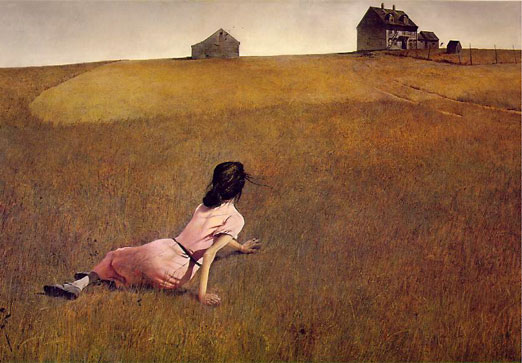
An adaptation of the Henry James short story “The Turn of the Screw”, The Innocents features a stunning performance by Deborah Kerr (who plays a governess) and two child actors.
It’s an extended meditation on Ephesians 6:12: “For we wrestle not against flesh and blood, but against principalities, against powers, against the rulers of the darkness of this world, against spiritual wickedness in high places.”
Or are Kerr’s misgivings just the projection of a fractured and troubled psyche? One of the best ghost stories ever made.
 The Red Balloon (1956 – 34 minutes)
The Red Balloon (1956 – 34 minutes)
A loose adaptation of the story of the Gospel, it is about the love of a Red Balloon for a little boy.
It’s set in Paris and has almost no words (except twice where the boy calls to the balloon: “Ba-lo!” (For those of us who have a special love for Blaise Pascal, who really knew the Gospel by the way, you may be interested to know that the director cast his own son as the Boy, and his son’s real name was Pascal.)
Parts of it are really funny. And the music is truly out of this world. The end will make you happier than you’ve ever been and captures better than anything else the sense of us being claimed and chosen by Another; and bound for a Good Place far away.
 AI (2001)
AI (2001)
A lovely sci-fi fantasy adaptation of Pinnochio, originally envisioned by Stanley Kubrick and handed by him to Steven Spielberg shortly before his death.
True to its fairytale form, it has a scene where the android boy is taken out into a forest by his human mother and abandoned. The scene between the boy and the mother is possibly the most powerful moment ever created in film:
 Monica: You won’t understand the reasons but I have to leave you here.
Monica: You won’t understand the reasons but I have to leave you here.
David: Is it a game?
Monica: No.
David: When will you come back for me?
Monica: I’m not, David. You’ll have to be here by yourself.
David: (pause) Alone?
Monica: With Teddy.
 David: No. (pause) No, no, no! No, Mommy, please! No, no. Please, Mommy.
David: No. (pause) No, no, no! No, Mommy, please! No, no. Please, Mommy.
Monica: They would destroy you, David!
David: I’m sorry I broke myself. I’m so sorry I cut your hair off. I’m sorry I hurt Martin.
Monica: I have to go. I have to go! Stop it! I have to go now.
David: Mommy, don’t! Mommy if Pinocchio became real and I become a real boy can I come home?
Monica: That’s just a story.
David: But a story tells what happens.
Monica: Stories are not real! You’re not real! Now, look. Take this, alright? Don’t let anyone see how much it is. Look. Don’t go that way. Go anywhere but that way or they’ll catch you. Don’t ever let them catch you! Listen, stay away from Flesh Fairs, away from where there are lots of people. Stay away from all people. Only others like you, only Mecha are safe!
David: Why do you want to leave me? Why? I’m sorry I’m not real. If you let me, I’ll be so real for you!
Monica: Let go, David! Let go! I’m sorry… I’m sorry I didn’t tell you about the world.
AI also has wonderful other characters. Gigolo Joe (Jude Law) is my favorite. He’s a lot of fun and comes to be David’s protector. Here are a few more quotable moments, useful in anyone’s daily life:
 Gigolo Joe: I’m in bad trouble.
Gigolo Joe: I’m in bad trouble.
David: My brain is falling out.
Gigolo Jane: Hey Joe, what do you know?
Gigolo Joe: Hey Jane, how’s the game?
Gigolo Joe: We will ask Dr. Know. There is nothing he doesn’t.
The movie is uneven in places. Spielberg doesn’t know how exactly to permit a fairy tale to exist on its own, thus his need to give awkward exposition and explain when in the future this is happening, linking it back to “real” events like IBM’s Big Blue playing chess against grand masters, or how history has traveled from the real world to this “future” time; and he runs into this same problem at the end.
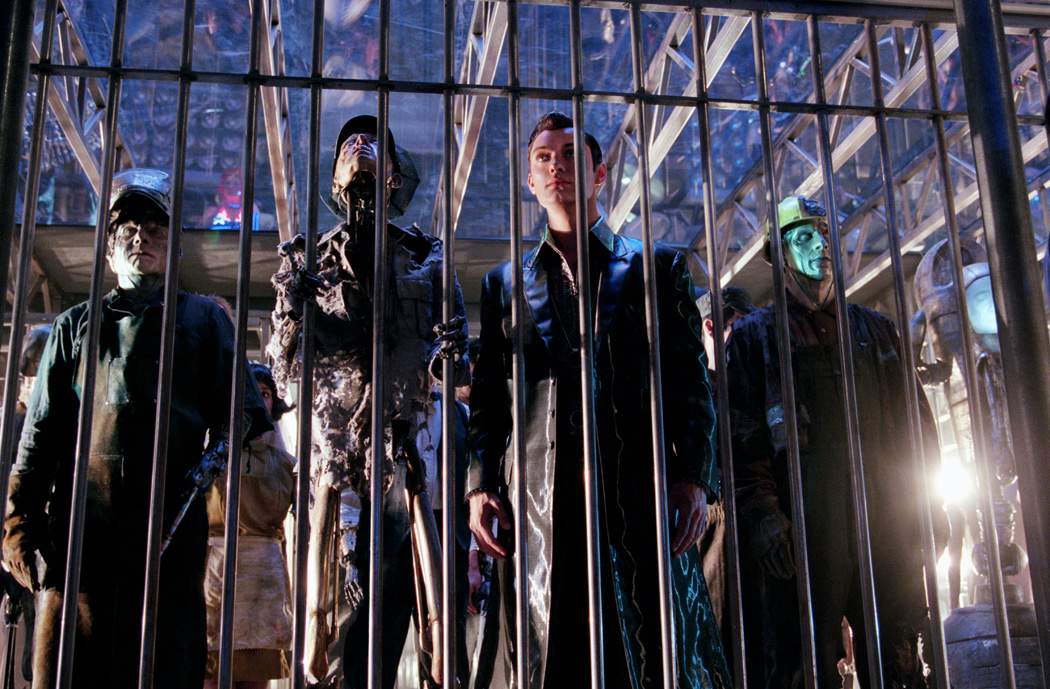
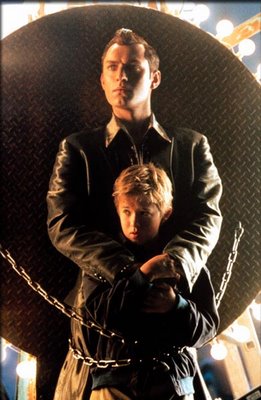
In fact, this isn’t a hard-science prediction story set in the future. It’s Pinnochio, the story of the little wooden Boy who desperately needs to be loved and to be real. It’s Luther in a storm crying out how can I find a gracious God?
Thus Spielberg is at his best once the story of the Boy has begun, or when the Boy is on his perilous flight from the Powers and Principalities. (You’ll be amazed at what extraordinary magic and terror can be evoked in a brief moment with the phrase: Moon rising!)
Problems aside, this is one of the great movies about childhood and magic and aching need. It needs to be seen.

COMMENTS
10 responses to “Mockingbird at the Movies: Fantasy, Dreamlife, and Childhood”
Leave a Reply









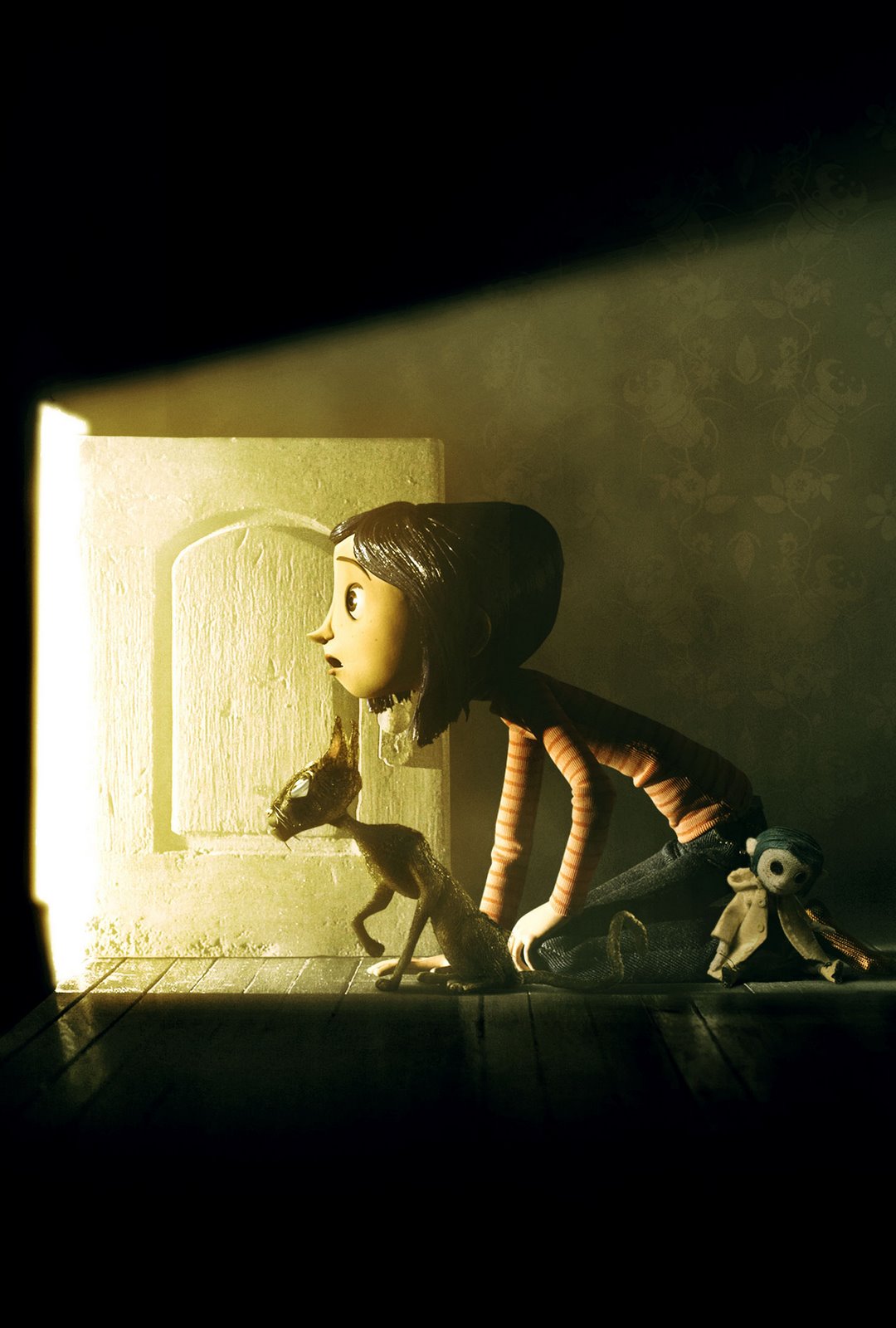





For some reason, the alien figures (actually 'mechas'–super evolved robots) at the end of AI nearly bring me to tears…almost what I imagine angels to be like. Thanks for the reviews SD!
John, this is really great stuff.
I've only watched AI once, and I found it difficult because I kept identifying with David. But after reading your take on the movie, I think I'm going to give it another try.
Oh, good. I was afraid I was the only other person in the universe who liked AI. Yes, a bit choppy and uneven. But so brilliant in vision that I can sacrifice some extra time just to see all that.
Click here to read the short story that inspired it, "Super Toys Last All Summer Long."
"Come away oh human child…"
Oh, please attribute one of my favorite poems to whom it belongs: W.B. Yeats.
Yeah, I know, I should have; but it was ALSO from one of the movies being reviewed, so I went with AI.
Thanks for drawing our attention to Yeats and his beautiful poetry. You are right and I'll fix the attribution in just a bit.
Touching and so persuasive a post this is, dear Stampdawg. Really Excellent!
Stampdawg – Thank you for sharing these! I really look forward now to viewing all of these (if possible) and re-viewing AI.
Love Yeats, love Andrew Wyeth, I will look up these movies! And thanks for the commentary on the Red Balloon; it seems so obvious and beautiful now but the last time I saw it (in elementary school) it came across as a scary and confusing commentary on human nature (which I guess it is) but without the Gospel message.
john-
this is my favorite mockingbird at the movies yet! thank you so much. i had never even heard of Paperhouse, let alone seen it. sounds incredible.
and your passion for AI means that I will definitely give it another shot. the first time around, it must have gone straight over my head…
I think/hope we'll be adding a couple more classics to the list soon with Where The Wild Things Are and Fantastic Mr. Fox.
Thanks to everyone for their kind words. Glad you liked the column.
The only mistake in THE RED BALLOON is the moment immediately following Golgotha. The director needs to give us more time to absorb the horror of what is happened — to deal with the reality of death. We need at least a few minutes here, before what follows.
One thing worth saying is that all the movies I mention are upsetting in places. Some of them very upsetting. That surprises people I suppose but to me at seems very truthful. My memory of childhood is that it was sometimes magical and beautiful but also frightening and violent.
So that's just an FYI before you see them… 🙂